Where does my waste belong?
View a quick waste sorting video or get more details below!
Download and display this printable signage at your office or living space!
Plastic utensils
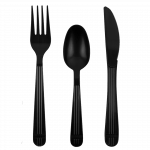
Normally, utensils are made from #6 plastic, which should go to the landfill. If the utensils are certified compostable plastic (PLA) and composting is available, they should go to composting. Even if they are a recyclable plastic, they are not recoverable in the typical automated recycling sort system.
Paper cups
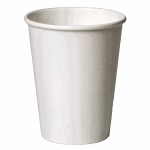
While a better option than Styrofoam because it is made from a renewable resource, these are not recyclable because they have a plastic liner to prevent liquids from soaking into the paper. There are paper cups with a PLA liner, which is certified compostable. These can be composted where collection facilities exist.
To-go boxes
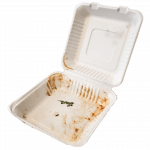
If totally clean, these can be recycled. If composting is available, to-go boxes can be composted (but sort out the trash inside!). Otherwise, it goes to the landfill. Remember: food contaminates recycling!
Coffee cups

Standard paper or Styrofoam cups should go in the landfill. Check labeling for compostable PLA liners which allow the cups to be composted where composting collection is available. Coffee cup lids are a #6 plastic and should be landfilled. Cardboard sleeves are recyclable and compostable, so make sure to sort correctly!
Brown napkins
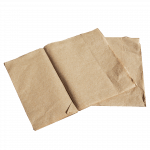
Paper napkins are compostable if facilities are available as long as they are not heavily dyed, in which case, they belong in landfill. These used paper products are not recyclable.
Bleached or colored napkins/paper towels/tissues

These materials are not recyclable because they are usually considered unsanitary once used; they are also made from low-grade, short fibers that cannot be recycled.
Soup cups
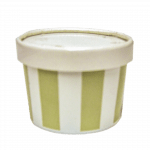
While better than Styrofoam because it is made from a renewable resource, paper cups are not recyclable because they have plastic liners that prevent liquids from soaking into the paper.
Pizza boxes
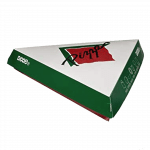
If clean, these can be recycled. If there is food residue or grease, it goes to the landfill. Brown corrugated cardboard pizza boxes can be composted where collection is available.
Plastic milk bottles (individual bottles or gallons)
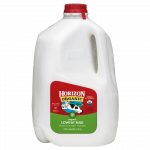
If empty, these can be recycled. Rinse it out first if you are willing and able! As a general rule, rinsing out plastic containers before recycling removes any leftover residue and decreases the chances that the item will be rejected and landfilled due to contamination.
Cardboard/paper milk cartons
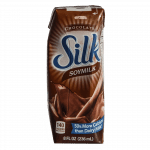
Recycle! These are different material than paper cups called aseptic packaging, which can be recycled at many recycling centers.
Plastic cups
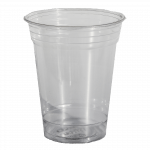
Cups labeled plastic #1-5 and #7 are recyclable. PLA compostable cups aren’t recyclable, but can be composted if collection is available. #6 plastic cups, like red Solo cups, aren’t recyclable at most facilities. #6 plastic is a polystyrene (PS), which has negative environmental and health impacts, so it should be avoided when possible. Always check the number on the bottom of plastics before disposing!
Other frequently asked questions
When people come into a “single-stream recycling” community after having lived in a community where everything was sorted by material type or nothing was sorted and everything went to the landfill, naturally there is some confusion on terminology. Single-stream or single-stream recycling means that all RECYCLABLE items accepted by the recycling facility can be put in one container. The materials will be sorted by a combination of people and machines when they arrive at the recycling center.
Single-stream does NOT mean that ALL waste goes into one container. It is very important that only recoverable materials approved by the recycler go into the container. See below for details on what is recyclable.
Uncoated paper products, cartons, and cardboard; glass; metal (aluminum, foil, steel); rigid plastics #1-5 & 7. NO DIRTY TO-GO BOXES; PAPER CUPS; FOOD-SOILED TO-GO CONTAINERS; COFFEE LIDS; PLASTIC UTENSILS; SOFT PLASTICS; COMPOSTABLE PLASTICS. Follow posted signage in dining and residential areas to avoid contamination.
Food and certified compostable serviceware (paper to-go boxes, napkins, PLA cups and cutlery, etc.). Many uncoated brown paper products (cardboard, unsoiled brown cardboard pizza boxes, paper bags, etc.) can be composted as well.
When you send something to the landfill, that is it: end of life. Simple, right? However, with both recycling and composting, companies are taking our waste and developing a commodity, creating jobs and contributing to the economy. In order for recycling centers to generate revenue, the materials must be converted into a commodity that buyers want as a feed stock for their operations or as a final product.
Like any commodity, sorted recyclables are responsive to both the demands and the volatility of the market. For example, when cardboard was selling for a premium, it made more sense to separate and bale cardboard to get a bigger rebate. But when the market dipped, single stream became more cost effective.
The materials a recycling facility will accept is influenced by the sorting process, how the materials act in the automatic sorting line. For example, flat plastic packaging acts more like paper than a plastic beverage container, so the automatic system that is designed to sort out plastic containers will miss the flat plastic packaging. Rules may also change as technology advances. We used to be told to take caps off of bottles because lids and bottles are different types of plastic. Now, machinery has been developed that can easily separate the two plastics, so you should leave the lids on. If lids are loose, they fall thorough sorting screens and become land-filled as waste.
In addition, not all communities have the same market access, technology at sorting points, and overall processes may differ. All of the information on the WashU Sustainability pages are up-to-date for WashU, the City of St. Louis, and most of St. Louis County. We recommend checking with your local municipality to confirm residential recycling rules for your home.
With thousands of recycling containers on campus, performing a complete redo of all signage is very expensive. We are planning a phased approach to signage updates, starting with the most high-impact areas. Printable waste sorting guidelines can be found here for your own use.
#6 plastics are Polystyrenes (PS). They have the same chemical make up as Styrofoam, but contain less air. #6 plastics have little value in the market for sorted post-consumer plastics and is most commonly shipped overseas for further processing. Because there is no market for #6 plastic, recycling companies would rather not accept it. Within the St. Louis region, some recycling facilities may accept #6 plastics, but they are still baled together with other low-value plastics (#3-7). When possible, seek out products packed in #1 or #2 plastic instead of #6 or Styrofoam.
With most containers, a quick rinse or wipe should be enough for residential recycling. However, no food residue (cheese, grease, sauce, ketchup, etc.) is allowable on paper products.
When participating in the annual RecycleMania competition, the recycling problem became very apparent. WashU dropped in all areas, both in the volume diverted and within the ranks of competing schools. For example, in 2015, our diversion rate over the competition period was 45%. In 2016, the diversion rate over the same period was 34%. In one category, the “Per Capita Classic”, WashU went from ranking 9 out of 232 in 2015 to 110 out of 208 in 2016.
Between January and April 2016, 52% of the recycling dumpsters were rejected from Resource Management. During the same time frame, about 40% of the compost totes were going to the landfill due to contamination.
The significant increase in rejected loads was in response to several factors, the main one being a steep decline in global recycling markets as countries like China and India, which had previously been the leading importers of sorted recyclable materials, began enforcing stricter quality controls on exporters from the US and Europe. After an aggressive education campaign, collaboration with partners across campus, and changing the recipient of WashU’s recyclable materials, this trend was completely reversed. In 2018 and 2019, no loads of recycling were rejected. In addition, compost rejections have also gone down to about 2% of post-consumer collection points.
Our goal for 2020 is to achieve a 55% diversion rate at the Danforth Campus and a 45% diversion rate at the Medical School. More information.
If you are willing and able, hold on to your compostables until you can toss them at a compost location! Otherwise, unfortunately, these materials will have to go to the landfill.
While we have a long-term goal to offer composting at dining facilities across campus, pilot locations have not yet demonstrated ongoing success. With continued education and making to-go materials more uniform across dining locations, we anticipate achieving a shift in campus culture and awareness. Once contamination is consistently below the allowable threshold, we will be able to better advocate for campus-wide post-consumer composting. Want to help with education efforts? Apply to become a Recycling Genius or WashU Green Ambassador today!
Post-consumer composting can be found at Bear’s Den, the DUC, Parkside Cafe, Common Grounds (Hillman Hall), the Village, the Kemper Art Museum Coffee Bar, and the Law School Cafe. Students living in the South 40 residential halls can request a compost collection bucket through the Res Hall Compost Program. Farmstead, Shell Cafe, and the Eric P. Newman Center (on Medical School Campus), and Whittemore House collect pre-consumer compost.